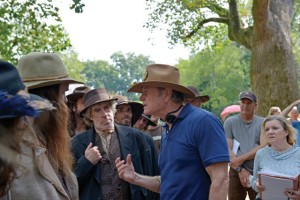Point of Departure
By Joan Tupponce

Wallace has shot films on location all around the world, but earlier this year, the 1967 graduate of E.C. Glass High School in Lynchburg was back in Virginia for his latest project, Point of Honor, a television pilot set during the Civil War, inspired by Lynchburg’s circa 1815 Federal style mansion of the same name, poised on a hill overlooking the James River.
He was 12, says the 6-foot 2-inch, sandy-haired director when he first became aware of the site, home to some of Lynchburg’s—and Virginia’s—most storied families: the Cabells, Daniels and Langhornes. “It was during the Civil War Centennial and I was intrigued with it.” His lifelong fascination with the house and the War Between the States led to this pilot, which was in production for eight weeks in and around Central Virginia last August and September. “Virginia is the absolute perfect place for it,” Wallace says of the series being co-produced by ABC Signature and Amazon Studios.
A historical drama, the series (which will air in January on Amazon.com) centers on a Virginia family whose life is torn apart by the Civil War. It was co-written by Carlton Cuse, who will also serve as an executive producer on the pilot—the same position he held on the hit television series Lost. “It begins with two friends in West Point [USMA], one from the north and one from the south,” explains Wallace. “At the outset of the war, the Virginian elects to free his slaves but still fight for the Confederacy. That is the pivotal starting point for the story.”
Born in Jackson, Tennessee, Wallace grew up in Lynchburg in a split-level brick and frame house off of Langhorne Road. His father, Thurman, was a salesman in the candy business and his mother, Evelyn, served as the secretary of Rivermont Avenue Baptist Church. His parents are both deceased now but his sister, Jane, still lives in Lynchburg. “I was really happy to settle down,” Wallace says of coming to Virginia in 1961. “We had moved from place to place. In three years, I went to five different schools.”
He discovered his talent for writing early in life. “My father was a natural storyteller,” he says, adding that his dad also encouraged him to read. He honed his skills through elementary and middle school and sought out creative writing classes in high school. “When a teacher would say ‘write an original story,’ I would be eager to do it,” he says, adding that he often wrote about his extended family, his aunts and uncles: “Most of my stories were anchored in laughter.”
After graduating from Duke with a degree in religion and completing another year there at the Divinity School, Wallace—who had a strong religious upbringing—moved to California and began writing screenplays and novels. He worked with television producer Stephen J. Cannell (The A-Team, The Rockford Files and 21 Jump Street), writing for television series in the late 1980s and early 1990s. His work in feature films took off after writing Braveheart, which was released in 1995 and starred Mel Gibson. (Wallace won both Oscar and Golden Globe nominations for the film, as well as the Writers Guild Award for Best Screenplay.)

The success of the film was confirmation that he should continue doing what he was doing, he says. “It was the turning point in my career.”
Wallace’s oldest son Andrew, 30, was 12 years old when his dad was shooting Braveheart in Ireland. (Andrew spent three weeks on set.) “That was the first time I remember experiencing what it was like to be on the set of a movie,” says Andrew, who describes his father as charismatic. “When he is working, he is one of the most considerate directors I have seen in that he cares about the extras,” he says. “He lets them know what’s happening. At the end of the day he shakes everybody’s hand on the crew. He creates such a fierce loyalty in the folks that work for him. He knows their values and contributions.” (Andrew and younger brother Cullen, 26, both work for their father’s film company, Wallace Entertainment, which produces original projects for film, television, music and video games.)
Wallace, who lost out on filming Secretariat in Virginia in 2009 because of a lack of competitive film incentives, is ecstatic about being back in the state for Point of Honor. “Virginia is so deeply a part of me,” he says.
He recalls that he first tried to sell the idea for Point of Honor 30 years ago when he was writing for television, but couldn’t get producers in Hollywood interested in it. “They thought Civil War things weren’t relevant,” he says with a wry smile.
Wallace says he only works on projects that stir his soul and that for him, both writing and directing are acts of faith: “The clearest distinction between writing and directing is that writing is a solitary experience, turning in work, and directing is an experience of turning out work. Directing is gathering a huge variety of talents and inspiring and encouraging them to move together to a unified vision. I can’t inspire an audience without inspiring the cast and crew. And I can’t do that if I am not inspired myself.”
